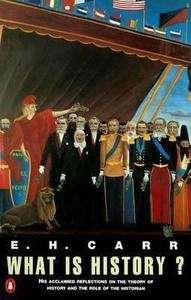What Is History?
. The George Macaulay Trevelyan Lectures Delivered in the University of Cambridge

Editorial Penguin UK
Fecha de edición noviembre 1990
Idioma inglés
EAN 9780140135848
208 páginas
Libro
encuadernado en tapa blanda
Resumen del libro
'SIMPLY TO SHOW HOW IT REALLY WAS'
Ranke, stating what he considered the proper aim of the historian, filled generations of historians after him with a burning zeal for objectivity.
But who is to say how things were? In formulating a modern answer to the question 'What is History?' Professor Carr shows that the 'facts' of history are simply those which historians have selected for scrutiny. Millions have crossed the Rubicon, but the historians tell us that only Caesar's crossing was significant. All historical facts come to us as a result of interpretative choices by historians influenced by the standards of their age.
Yet if absolute objectivity is impossible, the role of the historian need in no way suffer; nor does history lose its fascination. This posthumous edition includes new material by R.W. Davies which presents the major conclusions of Professor Carr's notes for the second edition and a new preface by the author, in which he reflects on the current mood of pessimism and despair among Western intellectuals and calls for a saner and more balanced outlook on the future'.
Biografía del autor
E. H. Carr, nacido en 1892 y educado en el Trinity Collage de Cambridge, ha sido uno de los historiadores británicos más influyentes. En 1916 ingresó en el servicio diplomático, ocupando puestos en París y Riga. Al final de la primera guerra mundial participó en el Congreso de Paz de Versalles. Fue también asesor de la Sociedad de Naciones y subdirector del diario The Times. En 1936 ocupó la cátedra Woodrow Wilson de Relaciones Internacionales en la Universidad de Cardiff. Entre sus obras, pueden destacarse La crisis de los 20 años (1919-1939); Bakunin;Dostoyevski, 1821-1881. Lectura crítico-bibliográfica; Estudios sobre la revolución; De Napoleón a Stalin y Los exilados románticos, La etapa final de su vida la consagró a la elaboración de los catorce volúmenes de la historia de la Rusia soviética. Murió en Cambridge en 1982.








